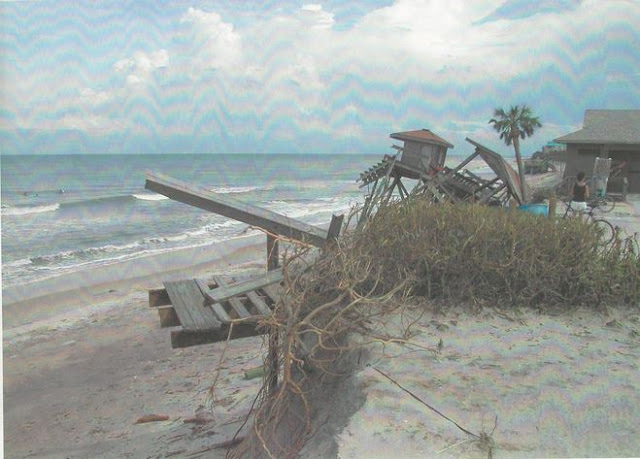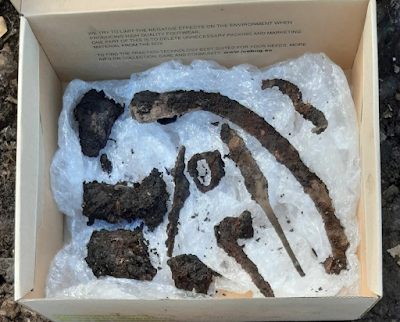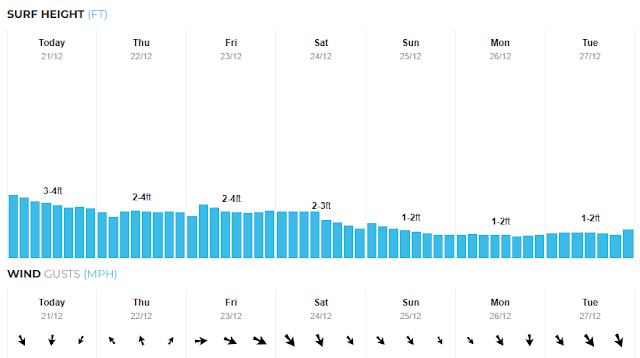Written by the TreasureGuide for the exclusive use of the Treasure Beaches Report.
.
 |
| WW I Dog Tag Found by Al C. |
Below is how Al described the find.
The first paid group hunt I did with the South Carolina Dirt Diggers (a Facebook group) was on a couple different smaller properties in Robertsville and Gillisonville in South Carolina. I didn’t find a ton of stuff here but a few civil war era bullets and rivets etc. At one of the sites I dug a aluminum tag that I could see had some text stamped into it but being aluminum I didn’t think much of it.
As you mentioned again the other day, looking at the coin and artifact auctions can really help you in this hobby. Point being I should have recognized this as something of interest, but didn’t right away.
Anyway, days later once I was home and looking through the various pieces and parts that I had found, I came across this aluminum piece again that I had totally forgotten about. I kind of figured it was an animal license dog tag piece and thought it would be cool if there was a year on it so I began to try to clean it with a brush. Not really seeing a year and not getting very far I brought it into work and had my art team guys ( I owned a graphics company at the time) photograph it and clean it up more. It didn’t take them long to figure out that the piece was actually a WW1 dog tag with the name Fred W. Smith and what turned out to be a location of Muse, Argoni. So this was getting interesting. We tried to find out more about Fred W. Smith but…there are many Fred Smith’s. Lol! As I searched on Iine many web sites that had info forced you to join the site which was a genealogical research company. I didn’t want to do that and didn’t get far but remembered my sister in law was doing all of that type stuff for my own family and so I reached out to her. In minutes she sent me copies of Mr. Smith’s enlistment papers and more info. In a few more minutes she sent me the names and last known addresses of his, I believe, 11 children. That info was a little overwhelming as I don’t make it a habit to call strangers out of the blue but felt a responsibility to try to get this piece back to the family. I posted this back to the original facebook group and someone from that group thought they knew the family and everything came together from there. I sat and talked with Ina Smith, the last surviving child of Fred W. Smith, and two of her daughters for a while. One of the things I asked how long her family lived in the area and she said, “since the King granted them land”! It was an awesome experience.
Below is part of one of the documents giving located by Al's sister-in-law.
 |
| Document Providing Informatoin On WW I Soldier. |
Congratulations on a great find and return Al. Thanks for sharing.
The internet provides some great research tools that weren't always so easily available..
---
Round metal tags like the one found by Al do indeed look like dog license tags. Some are round, but many come in other shapes. It isn't a bad idea to look for identifying information on tags. They can be hotel key tags or any of a variety of things. You might actually have something interesting or valuable.
Here is one dog license tag I once found with a metal detector.
 |
Dade County Florida Dog License Tag
Found With Metal Detector. |
Here is a link to an old post on collecting antique dog tags.
The Treasure Beaches Report Direct From Florida's Treasure Coast.: 10/1/14 Report - Gold and Jade Ring. Site Survey With Target ID. Poll Results. Where People Have Been Hunting Most. Antique Dog Tags.
And here is a link to a site about valuable dog tags and dog collars.
Antique Silver Dog Collar Auctioned | The Bark
That link will take you to some interesting stories such as the following excerpt about auctioned dog collars and tags.
One such highlight is a Victorian silver collar created in 1883 for a dog named Help. The shaggy black Scotch Collie was trained and handled by John Climpson, a passenger guard on the London, Brighton and South Coast Railway. The dog was equipped with a collection box, and traveled extensively throughout Britain and France from 1882 to 1889, raising money for the “Orphans Fund”—a charity that assisted children of railway workers who had died on the job. The tag on his collar was inscribed with a London address where donations would be “thankfully received & duly acknowledged.” His appearances at railwaymen’s meeting, fundraisers and dog show made Help a celebrity, and prompted a legion of charity-collecting dogs.
The source of the dog’s name? Here’s a clue: Help’s image appeared on badges with the slogan “Help Our Noble Railway Dog,” with proceed from the sales of the badges going to orphanages. During his lifetime, Help brought in thousands of pounds sterling to aid the Orphans Fund. Upon his death in 1891, at the age of 13, a railway magazine ran a tribute: “No dog probably lived a more useful life the did ‘Help.’” His lovely silver collar and tag is estimated to sell for $2,500 to $3,500...
---
You can find many tpes of tags that look similar. Cremation tags are another example. They aren't uncommon finds, although I've read that cremation remains are supposed to be released three miles out if placed in the ocean. I don't think many actually do that though.
---
I hope you had a great Christmas. Many find it a hard time.
Blessed are those who mourn, for they shall be comforted. Matthew 5:4.
Seek and you will find.
TreasureGuide@comcast.net

































